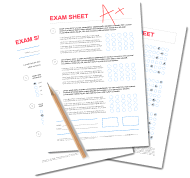IELTS Exam Syllabus 2026Sectional Guide
Cover Section-Wise Syllabus with our Experts
Practice various sections with our Mock Tests

Introduction
The IELTS syllabus contains a total of four sections, i.e. Listening, Reading, Writing, and Speaking. Candidates who are applying for IELTS Academic or General Training must appear for these four sections. Each section presents a unique challenge and demands a comprehensive understanding of the English language. Thus, students need to have a proper grasp of the syllabus for each of the section. Let's explore the section-wise IELTS exam syllabus for 2026 to achieve a high band score.
IELTS Exam Syllabus 2026
Students who are planning to take the IELTS exam must know about the IELTS syllabus and exam pattern. However, the listening and speaking sections are the same in both the IELTS Academic and General Training Test, while the reading and writing sections will be different. Thus, for a better understanding have a look at the table given below to know the syllabus of IELTS exam.
Test Component
IELTS Academic
IELTS General Training
Time Allotted
IELTS Listening
4 parts, 40 questions
4 parts, 40 questions
30 minutes
IELTS Reading
3 passages, 40 questions
3 sections, 40 questions (Question styles vary in this type of test)
60 minutes
IELTS Writing
- Task 1: Describing visual information.
- Task 2: Write an essay
- Task 1: Writing a letter (Formal, Informal, Semi-Formal)
- Task 2: Write an essay
60 minutes
IELTS Speaking
- Part 1: Introduction Round
- Part 2: Cue Card Round
- Part 3: Long Discussion or Follow-Up Questions
- Part 1: Introduction Round
- Part 2: Cue Card Round
- Part 3: Long Discussion or Follow-Up Questions
11-14 minutes
Overall, this is the IELTS exam syllabus 2026 that candidates must know to achieve a high band score. In the next sections, we will explain the syllabus of each section in detail.
1. IELTS Exam Syllabus for Listening Section
The syllabus for IELTS listening section is the same for both the IELTS Academic and General Training Test. The IELTS listening section evaluates your ability to listen to conversations, understand the ideas, follow the narratives, and make conclusions based on them. However, the audio includes a range of accents that can be played only once. Now let’s have a look below at the IELTS listening syllabus for 2026.
Number of recordings played
04
Total questions asked
40
Time allocated
30 minutes (plus 10 minutes to write answers on the answer sheet)
Mark for each correct answer
1 mark
Types of Recordings
- Recording 1: A conversation between two people related to the social context.
- Recording 2: A monologue speech that carries a topic of everyday life such as weather conditions
- Recording 3: A conversation between four people related to the educational basis
- Recording 4: Monologue speech on an academic basis, it must be a lecture.
Types of Questions
- Multiple Choice Questions (MCQs)
- Matching
- Plan/Map/Diagram/labeling
- Form/Note/Table/Flow Chart/Summary Completion
- Sentence Correction 6 Short Answer Questions
This is the IELTS listening syllabus that students must know. Now in the next parts of this section, we will let you know about tips and skills required for the listening section of the IELTS Exam.
Tips for IELTS Listening Section
- Listen to the recording attentively and focus more on answers than understanding everything. Remember that the recording is played only once.
- Take notes on your question paper while listening to the recording.
- Proofread your answer and check for spelling and grammar errors before submitting.
- Try to use all capital letters for your answers.
- Write within the given word limit for each question.
Skills Required for IELTS Listening Section
Having an understanding of syllabus of IELTS listening section is not quite enough. One needs proper skills and techniques to excel in the task. Thus, look for some skills below that you can execute in the listening module.
Prediction
Before each recording plays, you will get a short time to read the question. Try to predict what the answers can be in the given time.
Synonyms and Paraphrasing
Try to look out for synonyms in the listening section and paraphrase the keywords and phrases in the questions.
Recognizing Distractors
Distractors refer to the words or phrases that are used by a speaker to qualify something or to correct themselves. These distractors are common in the listening test and are intended to try to catch out.
Connected Speech
Connected speech is when the words and sounds run so fast making it difficult for a non-native speaker to understand. So you must make a habit of listening fast and catching the sentences.
This is all about the IELTS listening section. In the next part, we will discuss the IELTS reading section in detail.

 Access Listening Mock Test
Access Listening Mock Test 2. IELTS Exam Syllabus for Reading Section
The syllabus for IELTS reading section tests your ability to understand the main ideas of the text, details, and implied meanings in the texts. It is different for both Academic and General Training Test. However, one common thing in both versions is that it contains the passages. Now let’s have a look at the IELTS reading syllabus 2026 for the betterment of test-takers.
Total number of passages
03 (In both Academic & General Training)
Total number of questions
40
The average length of the passages
2150-2750 words
Time per passage
20 minutes
Mark for each correct answer
1 mark
Types of tasks
IELTS Academic
- One long reading passage with several questions
- Topics would be of general interest
- Texts will come from books, journals, and magazines
IELTS General Training
- Contains two or three short texts on everyday topics
- Contains two short, work-related, factual texts. And includes one longer text on a topic of general interest.
- Texts are taken from advertisements, official documents, and newspapers.
Types of Questions
- Multiple Choice Questions
- True/Fale/Not Given
- Matching Information
- Matching Headings
- Matching Features
- Matching Sentence Endings
- Sentence Completion
- Summary/Table/Note/Flow Chart Completion
- Diagram Label Completion
- Short Answer Questions
Overall, this is the IELTS reading syllabus 2026 that students must be aware of. The next parts will let you know about the tips and skills required for the IELTS reading portion.
Tips for IELTS Reading Section
- Understand every detail of the figures, graphs, or images in the question paper to be precise while answering.
- Be grammatically correct and to the point.
- Read the questions carefully and find the answers from the passage.
- Enhance your vocabulary by reading the different types of texts from different sources.
- Increase your speed while reading the passage or text.
Skills Required for IELTS Reading Section
As now you understand the syllabus for the IELTS reading section, it is vital to know about the skills too. Thus, in this section, you will get to know about the useful tips for the IELTS reading module.
Skimming
Skimming refers to reading the text quickly to understand the overall meaning. This technique does not let you read each word or study the text in detail.
Scanning
Scanning refers to reading the text fast to find or locate some specific information. However, scanning won’t provide you with the real answer but it will help you locate where the answer is.
Detailed Reading
Detailed reading is when you read each word of the passage or text and maybe the whole paragraph, word for word to understand exactly what the passage is trying to convey.
Vocabulary
IELTS reading is more of a vocabulary test than a reading test. Thus, you need to enhance your vocabulary for scoring well in the reading section of IELTS.
Overall, these are the skills required for the IELTS reading section. The next part will let you know about the syllabus for IELTS writing section.

 Take Reading Mock Test Now!
Take Reading Mock Test Now! 3. IELTS Exam Syllabus for Writing Section
The IELTS writing test assesses your ability in coherence and cohesion, lexical resources, and grammatical range and accuracy. This section varies for both Academic and General Training versions. Therefore, it is important to understand the IELTS writing syllabus 2026 for the candidates. So let’s have a look at it.
Total number of tasks
Task1, Task 2
Total allocated time
60 minutes
Time per task
Task 1- 20 minutes Task 2- 40 minutes
Mark for each correct answer
One mark for each correct answer
Types of Questions
IELTS Academic Writing Task 1
- You need to describe visual information in 150-200 words
- It will be in the form of a map, chart, graph, diagram, or table.
IELTS Academic Writing Task 2
- You need to write an essay in at least 250 words providing your viewpoint
- The tone should be in a formal style.
IELTS General Training Writing Task 1
- Write a letter in at least 250 words.
- It is of three types: Formal, Semi-Formal, and Informal
IELTS General Training Writing Task 2
- Writing an essay in response to a point of view, argument, or problem
- It needs to be in personal style.
Overall, this is the IELTS writing syllabus for 2026. The next parts will let you know about the useful tips and skills needed for the reading section.
Tips for IELTS Writing Section
- Try to write over 150 words for task 1 and over 250 words for task 2.
- Avoid repetition of ideas, phrases, and words.
- Use active voice. Avoid writing in the passive voice.
- Do not submit your answer without the proper proofreading.
- Write about what you know instead of writing anything.
Skills Required for IELTS Writing Section
As we have discussed the IELTS exam syllabus of the writing section, further we should look over the skills needed for the writing section. Thus, this part will let you know about the vital skills for the writing section of IELTS.
Summarizing and Explaining
Whether it is the situation or some visual representation, you will be tested on how well you summarize and describe your task. This will be a test of your ability to show coherence and cohesion.
Considering Viewpoints & Problems
Examiners look for your viewpoints which involves deep research into the topic and considering all the facts taken. You will be tested on the ability to analyze problems before concluding.
Explaining Statistics and Diagrams
Test takers must have the skill to interpret the information from a graph, table, chart, diagram, or map. Further, you will also have to explain in your own words.
Enhanced Grammar
When appearing for the IELTS exam, accurate and appropriate grammar is necessary. Also, just like vocabulary grammar holds the importance of 25%
These are all of the skills required for the IELTS writing section. In the next section, we will discuss the syllabus of the last module of IELTS which is IELTS speaking.
 Take Writing Mock Test Now!
Take Writing Mock Test Now! 
4. IELTS Exam Syllabus for Speaking Section
The syllabus for IELTS speaking section is the same for both IELTS academic and general training tests. It is designed to test a wide range of skills such as communication, opinions on everyday topics, answering a range of questions, and many more. However, students find this section most difficult. Thus, you must understand the IELTS speaking syllabus in detail through the table.
Total number of rounds
03
Total allocated time
11-14 minutes
Mark for each correct answer
1 mark
Types of tasks
Part 1- Introduction and Interview (You need to introduce yourself and the examiner will ask you questions related to your general interests, hobbies, family, work, and studies)
Part 2- Cue Card (One task card will be given to you and you need to speak on it for two minutes. It will include a topic and some pointers that you need to explain)
Part 3- Follow-Up Questions or Discussion (This part will consist of the follow-up questions that an examiner will ask you related to your cue card topic. You need to briefly explain your answer with examples and experiences)
This is all about the IELTS speaking syllabus for 2026 that students must know. Now let’s discuss some tips to excel in the speaking section of IELTS.
Tips for IELTS Speaking Section
- Speak clearly and fluently.
- Be confident while speaking your answer.
- Focus on your vocabulary, phrases, idioms, and grammar before appearing for the exam.
- Don’t take long pauses while speaking.
- Use linking words and structures.
Skills Required for IELTS Speaking Section
The speaking section is one of the most difficult modules of the IELTS exam. This section needs proper strategies and skills to excel. Thus, in this section, we have mentioned some of the important skills that will help you ace the IELTS speaking section.
Lexical Resources
You must understand the meaning of difficult words and be aware of paraphrasing and synonyms for the IELTS exam.
Pronunciation
The examiner will look for your pronunciation and how well you are using the words and sentences. So you must have a strong hold on the pronunciation.
Grammatical Structures
Use a range of grammatical structures by using simple and complex sentences to express what you want to say.
Extend Your Answers
Try to extend your answers in the speaking section. It will show that you have an depth knowledge of the topic. Also, don’t wait for the examiner to stop you from speaking.

 Access speaking Mock Test
Access speaking Mock Test Conclusion
To conclude, we have discussed the IELTS syllabus of 2026 which plays a vital role in the life of IELTS candidates. Further, this write-up has given you an idea of each section and its different question types. Still, if you are facing issues in understanding the IELTS syllabus then we are here for you. Connect with our experts at Gradding.com and receive the best assistance and guidance on the IELTS syllabus, exam pattern, dates, registration, fees, and eligibility.
Buy Mock Test Package and get Flat 50% OFF
Reach the Desired Scores and Stand on Top with the Best Guidance. Talk to Experts for ielts Counselling!

Predict Your IELTS Band Score forFree with our Band Predictor Tool!
![]() Analyze Your Module-wise Preparation
Analyze Your Module-wise Preparation
![]() 100+ Mock Tests by Expert IELTS Faculty
100+ Mock Tests by Expert IELTS Faculty
Frequently Asked Questions
The IELTS syllabus consists of four sections that are: Listening, Reading, Writing, and Speaking. It is 2 hours 44 minutes plus 10 minutes of transfer time.
You may take the IELTS exam as many times as you like, as there is no limit for taking the IELTS exam.
IELTS is a single exam, but there are two types: general and academic. While the general is for everyone who wants to settle in an English-speaking country, the academic is for students who want to study or work in a new country.
No the standard validity of IELTS result is two years from the date of the test. There is no official extension to three years.
Yes, you can surely do that. But, in general, the questions are never repeated as in any of the previous papers. They are completely based on current affairs. However, you can refer to them to get an idea of the IELTS exam pattern so that you can prepare accordingly for the test.

Claim free IELTS Classes now!
We will help you secure admission in Top Universities Abroad with Completely FREE IELTS Coaching






